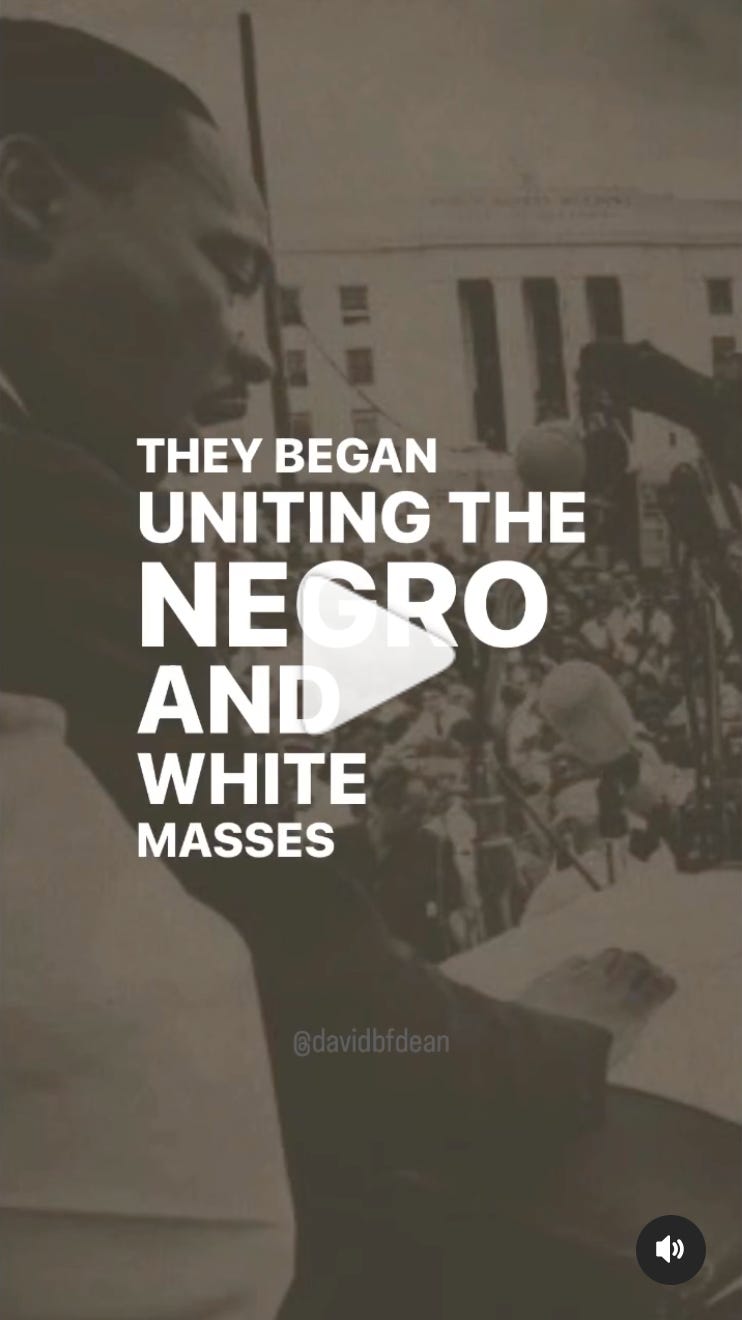Martin Luther King on the Social Movement that Jim Crow was Designed to Destroy
In a speech at the close of the 1965 march from Selma to Montgomery, King praised the multiracial Populist movement of the late-nineteenth century and called on us to learn from it.
I first wrote this article two years ago. I’m republishing it now with the hope that its lessons can help us face the distinct challenges of today.
For those seeking to find greater political clarity, personal direction, community, and emotional strength in this difficult political juncture, consider joining us for the online training series, Solidarity in the Face of MAGA, running from late January through much of February. We would love to have you. Registration remains open through February 2nd.
On March 25th 1965, Martin Luther King stood in front of a crowd of thousands who had just marched from Selma to Montgomery and gave a speech in which he shared a detailed history of the roots of racial segregation and the denial of the right to vote in the South. It is a speech that I was never shown in school.
He drew on work of historian C. Vann Woodward and told the crowd that the Jim Crow system was not a natural one following the Reconstruction period, but one explicitly designed to divide and conquer the Populist Party, a political organization that, although not perfect, brought together poor white and Black people to challenge racism and capitalist exploitation. In the 1880s, the party began winning elections throughout the South.
About five years ago, I opened Woodward’s The Strange Career of Jim Crow where he told the tale. Populist leaders, he wrote, organized the Black and white masses with messages like, “You are deceived and blinded that you may not see how this race antagonism perpetuates a monetary system which beggars you both.” In Georgia, in 1892, when a Black Populist organizer was threatened with lynching, Woodward wrote that, “Two thousand armed white farmers, some of whom rode all night, responded to [a] call for aid and remained on guard for two nights at his home to avert the threat of violence.”
Through the forceful legislation and mass propaganda associated with Jim Crow, the southern ruling class destroyed the Populist movement, preserving the southern oligarchic order through enforced segregation, disenfranchisement of African Americans and poor whites, and diversion of the pain of exploited, non-elite whites toward extreme racial prejudice.
King called Woodward’s book, “The historical bible of the civil rights movement.” He shared it on this day in Montgomery because he firmly believed that history must be forefronted in movement-building. This is one of the most important lessons that I have learned from King—that we must study the past because without it we will not be able to find a strategy capable of moving us past present injustice. When we root ourselves in history, we can see that inequality, division, and prejudice are not natural, but are so often the product of powerful people manipulating and dividing the masses for their own economic gain.
This is as true today as it was 60 years ago when this speech was made; as it was in the late 1890s when Jim Crow was institutionalized; as it was in the 1700s when poor European tenant farmers and slum-dwellers were made settlers in the North American colonial backcountry to serve as a military buffer protecting the plantations of the rich from Native nations seeking to reclaim stolen land; as it was decades before that when the first forms of white privilege were enshrined in Virginia legislation to stop multiethnic revolts threatening ruling class power.
Unveiling these histories and showing them to the public may be the only way to reconstruct the broad coalitions required to fundamentally change this society.
To learn more about divide-and-rule tactics of behind the return of the current administration to the White House, consider reading this illuminating excerpt from Naomi Klein’s most recent book, Doppelganger.
Here is a video I posted to Instagram with some important parts of King's speech in Montgomery. I hope it is a useful resource for you.






